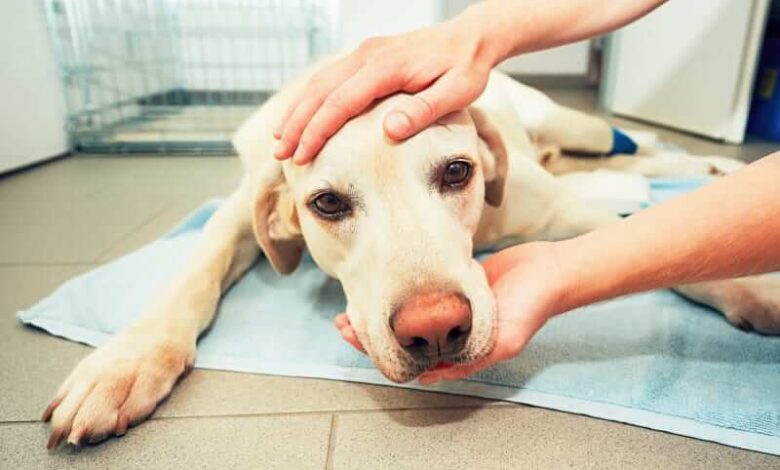Poisoning Symptoms in Dogs and Emergency Response

Your dog’s environment is full of potential toxins. Although you do your best to keep toxic substances away from your dog, exposure to the toxin is still possible. If you suspect your dog has been exposed to a toxin, you should immediately go to the nearest veterinary clinic.
Common Symptoms of Poisoning in Dogs
Symptoms of poisoning vary depending on the substance and amount your dog inhales or eats. There is no single symptom you can use to detect the condition. However, there are some common symptoms to watch out for, such as digestive or neurological issues.
Drooling or Foaming at the Mouth
Many dogs will experience mouth irritation after eating or chewing something poisonous. This is especially common after a dog bites a poisonous plant or tastes a poisonous chemical. If you notice your dog drooling or frothing, try to identify what he has been chewing or eating, put it out of your dog’s reach and save a sample in case he needs it. Consult your veterinarian for advice on next steps.
Digestive System Disorders
Many toxins cause irritation of the digestive tract leading to nausea, vomiting and diarrhea. Dogs may lose their appetite before other symptoms develop. In some cases, you may see blood in the vomit or stool.
Vomiting is often the first sign of drug ingestion, poisonous plant ingestion, or toxic food ingestion. If your dog suddenly starts vomiting, it should not be ignored. In this case, you should seek evidence of toxin ingestion and contact your veterinarian.
Weakness
Toxins can negatively affect organs and bodily functions, making a dog feel sick and uncomfortable. Many dogs become tired and sluggish when they feel sick. Also, some toxins, such as rat poison, can cause internal bleeding. This blood loss can cause drowsiness. Xyliltol, an artificial sweetener, can cause dogs to drop in blood sugar and make them sluggish.
Seizures and Muscle Tremors/Spasms
Many toxins affect the nervous system and muscles. This can lead to seizures, tremors, or involuntary muscle spasms. Generally, toxic drugs and poisonous plants cause such symptoms. If your dog involuntarily begins to tremble or twitch, it may be a good idea to immediately take a video of the symptoms. Look around to see if you can find toxins. Unless your dog already has a condition such as epilepsy, possible toxin ingestion should be considered. Consult your veterinarian as soon as possible at the first sign of muscle spasms, tremors or seizures. Many toxins can quickly lead your dog to death or serious illness.
Fainting
Some toxins act quickly and can cause the dog to pass out without any other symptoms. To this situation; It can be caused by any toxins that affect circulation or heart function, such as prescription drugs, illegal substances, and chemicals. If your dog suddenly faints or loses consciousness, it is an emergency. You should take your dog to the nearest open veterinary clinic.
Difficulty breathing
Toxins that affect the respiratory system can cause wheezing, difficulty breathing, shortness of breath, slow breathing, and trouble breathing. You can also see that the color of the gums has turned blue. If your dog is having trouble breathing in any way, it should be treated as an emergency. You should take your dog to the nearest open veterinary clinic immediately.
Abnormal Body Temperature
When a toxin acts in the body, you may see your dog’s body temperature rise or fall. Low body temperature is called hypothermia. Fever or high body temperature is called hyperthermia. Persistent muscle tremors or seizure activity can cause body temperature to rise rapidly. If you suspect your dog is too cold or hot, you should check their body temperature (breech). Contact your veterinarian if your pet’s temperature is higher or lower than normal.
Wounds or Burns
Caustic substances can cause sores or burns on the skin and in the mouth. Many harmful chemicals can irritate their skin and oral cavity if a dog comes into contact with them. Some plants can injure or irritate, especially if they are chewed. Rinsing the affected area can minimize irritation, but it’s still important to contact your veterinarian for further advice.
Pale, Blue, or Yellow Gums
Some toxins affect the mucous membranes of dogs (gums, tongue, eyelids, oral cavity) in ways that can be seen. For example, eating onions can cause anemia and cause gums to appear pale and whiter. Blood loss from rat venom and other bleeding-causing toxins also causes gums to appear pale. Some poisonous herbs and medications that affect the liver can cause the gums to appear yellowish (jaundice). Toxins that affect the cardiovascular or respiratory systems can cause blue-colored gums.
Swelling
A dog’s face or limbs may swell after exposure to the toxin. Dogs show swelling reaction to snake or insect bites in that area. If you notice swelling in one area of your dog’s body, this may be a problem.
Behavior Changes
Your dog may become very hyperactive or agitated after ingesting a toxin. This condition usually occurs after eating a stimulant such as chocolate, caffeine, or medication. Conversely, your dog may become depressed or react minimally, especially if your dog has taken sedatives or alcohol. .
Other Symptoms
- Diarrhea or blood in the stool (bright red blood or dark black tarry stools)
Vomiting or loss of appetite
seizures or tremors
Behavioral changes (drowsiness or unsteadiness when standing or walking; hyperactivity)
Bruising or bleeding (best found in areas with little or no hair, such as the gums, inside the ear flaps and inside the groin; nosebleeds or bloody urine)
Poisoning can cause a wide variety of effects on your dog’s body. Some may have immediate consequences, while others may have longer-term consequences such as anemia or organ damage. Also, some symptoms such as irregular heartbeat or liver failure will be impossible for you to notice on your own. That’s why it’s so important to take any noticeable symptoms seriously and consult your veterinarian immediately.
What should I do if my dog has been poisoned?
If you think your dog has been poisoned, stay calm and make sure the source of the poison is out of your dog’s reach. If it’s daytime, call your veterinarian immediately and tell him what he ate and how much he ate. If he gives you an instruction to do at home, do as he says. Never try to make your dog vomit without being directed by your veterinarian, as some toxins will cause further damage when re-vomited.
At night, go to the nearest emergency veterinary clinic. When you go, take the product you think your dog has been poisoned with. If it is medicine, the package inserts and the packages of other substances will help the veterinarian. Be sure to provide as much information as possible about the toxicant, including package information (if applicable), when the exposure occurred, how much was swallowed or touched, and any signs your dog shows. You will also need to know the approximate weight of your dog and information about his medical history. List all medications and supplements your dog is taking
If your dog is showing signs of poisoning, there is no time to waste. Getting them to a veterinarian as soon as possible will give them the best chance.
Diagnosing Poisoning in Dogs
Your veterinarian will want to know what is causing the toxicity in your dog, so bring any packaging or item with you, as long as it is safe. Although it is not possible to test for all toxins, analysis of blood samples should help determine the cause.
After your doctor stabilizes your dog, he will want to know how much his organs are affected by the poison by doing blood work. Other than that, in cases where you don’t think you ate or touched something that could be poisoned, they may do other tests to understand the cause of the problem.
What to Do in an Emergency
If you have any reason to suspect poisoning, have multiple symptoms, or notice that your dog has interacted with something dangerous, take immediate action. The faster you are, the better your dog will be. Here are the steps you should take:
- Keep calm and steer your dog away from the potentially toxic substance.
Note the condition and your dog’s symptoms.
Contact your veterinarian. If it is out of business hours, call the nearest emergency room and explain the situation and find out if there is anything you need to do at home before taking your dog there.
If possible, safely collect any remaining potential poisons or packaging. If your dog has vomited, get a sample. This will help the veterinarian diagnose and treat your pet.
Poisoning Treatment in Dogs
Your veterinarian will evaluate your dog’s condition before deciding on a course of treatment. Their priority will be to stabilize your pet before performing any diagnostic test or procedure.
Your veterinarian will choose treatment based on the substance your dog has been exposed to. That’s why examples are so important. If possible, take a photo of the item or tag on your phone. If you don’t know what is poisoning your dog, keep in mind that your veterinarian cannot test for every possibility, but blood tests can help identify the source. Some poisons, such as antifreeze and some rat poisons, have antidotes, so in such a case your vet will administer the antidote as soon as possible.
The main goal of treatment will be to prevent further absorption of the substance into your pet’s body. This may include the use of activated charcoal to absorb the poison from the stomach, an enema to flush the digestive tract (fluid injection into the lower intestine), or gastric lavage (a tube is passed into the dog’s stomach to deliver water). If your veterinarian deems it appropriate, he or she may also use drugs that can cause vomiting medically or diuretics.
Toxic Substances to Consider for Dogs
There are all kinds of substances that can poison your dog. While some chemicals or insecticides are already known to be dangerous, some are safe for humans. For this reason, it is generally assumed to be safe for dogs. But dogs have a different metabolism, so their safety cannot be judged by human standards. Below are common dog poisons to avoid;
- Over-the-counter medications for people, such as acetaminophen or ibuprofen
blood pressure pills or antidepressants
Prescription or over-the-counter medications for dogs when higher than prescription doses are encountered.
Human foods that are dangerous to dogs, such as garlic, onions, or chocolate
Rat poison and insecticides, such as ant baits or slug pellets
Household products, from bleach and other cleaners to batteries and antifreeze
Plants that are dangerous to dogs, such as tulips or holly, in the home or garden
If you think your dog has been poisoned, immediately call your veterinarian and apply to the nearest open veterinary clinic.




